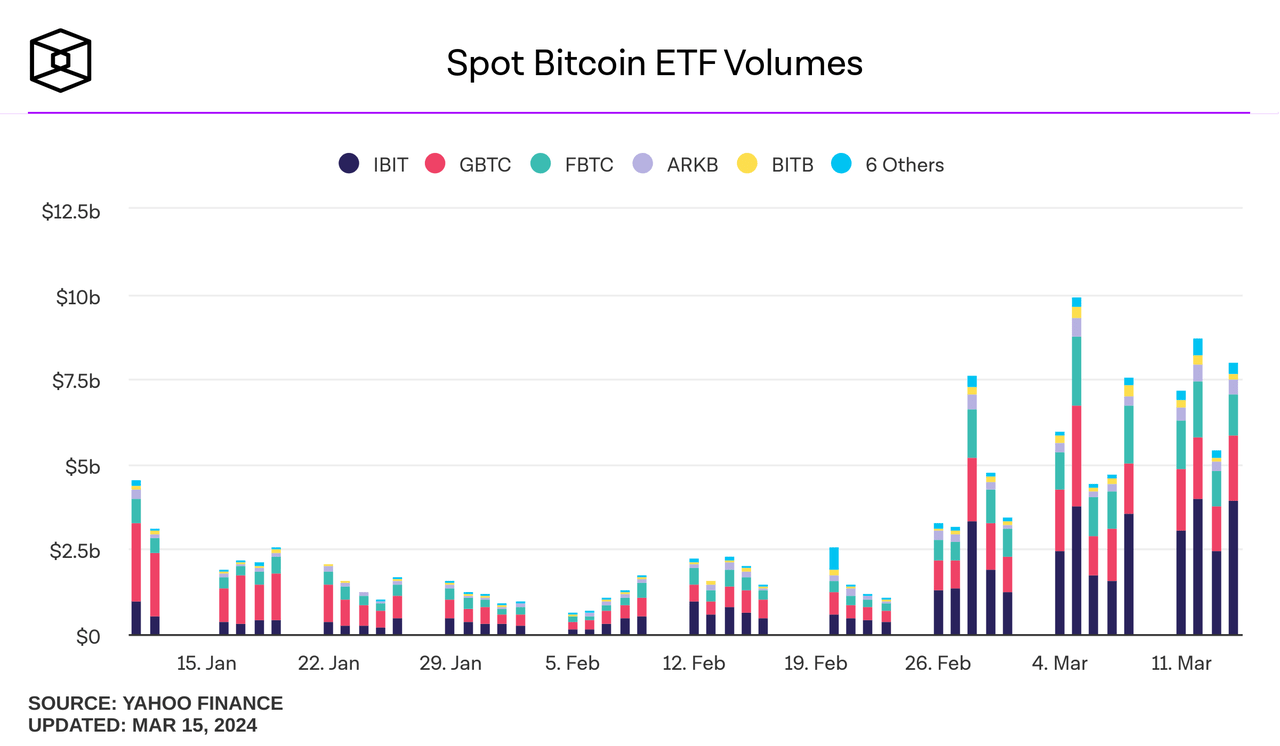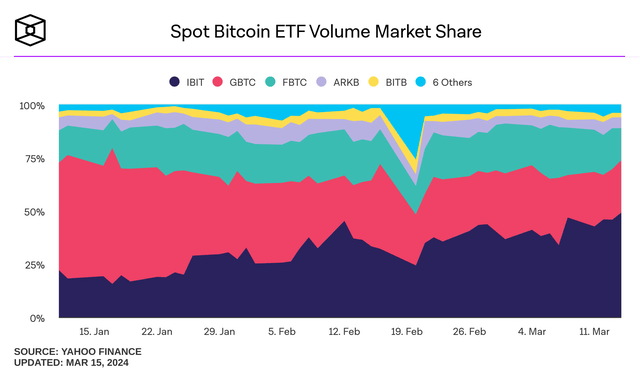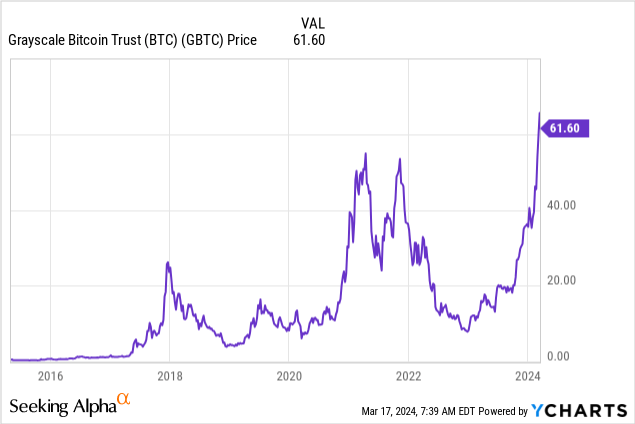Alex Potemkin/E+ via Getty Images
I’ve been writing about the Grayscale Bitcoin Trust (NYSEARCA:GBTC) for a long time. My oldest article on Seeking Alpha dates back to 2016 when Bitcoin was around $600. I won’t be writing as much about the Grayscale Bitcoin Trust in the future as I have in the past. Simply, because there are now many alternative and easier ways to get exposure to Bitcoin. As I wrote in my last article on GBTC I think these are simply better products. Most notably, Grayscale chose to stick to a very high fee. There is some good news.
Grayscale just gave me a good reason to write about its trust again because it has come up with the idea to launch another Bitcoin ETF (with more competitive fees). This one will be called BTC and the S-1 can be read here. On top of that they’re seeding it through spinning off Grayscale Trust shares into that ETF.
In their letter to shareholders they’re explaining the idea like this:
Most notably, this new ETF would be designed to have a materially lower fee than GBTC and through the innovative mechanics of a GBTC “spin-off” — which means a certain amount of the Bitcoin backing GBTC shares (as of a to-be-determined record date in the future) would be utilized to ‘seed’ the new Grayscale Bitcoin Mini Trust, subject to appropriate regulatory approvals. If approved:
We believe this would be net-positive for existing GBTC investors, who would benefit from a lower blended fee with the same exposure to Bitcoin, spanning ownership of shares of both GBTC and BTC.
Here’s my take on the situation. Grayscale has been charging 2% on assets under management for years. An incredible fee stream on one of the only ways to get access to Bitcoin in the U.S. regulated market. They promised they’d lower fees on conversion to the ETF wrapper and they did. I’ve argued for years they likely viewed it as a sensible business decision to convert to an ETF. If you believe in Bitcoin, you expect enormous flows towards an ETF product. With ETF products it tends to be the case that flows are directed towards the largest ETF in the market. Because Grayscale would have a headstart they of many billions of dollars they would top the leaderboard.
However, the U.S. tax system and its capital gains tax likely makes it so, that there are Grayscale Bitcoin Holders for whom it doesn’t make sense to sell even if they can reduce fees by 1.1% on an annual basis or more.
Maybe they were surprised how low competitors put their fees. Maybe Grayscale simply wanted to keep charging high fees on their captive holders. But the result is that new flows are not going towards Grayscale at all.
Spot Bitcoin ETF’s are a huge success but the iShares Bitcoin Trust (IBIT) is already ahead in volume (even though the AUM is much smaller). Fidelity Wise Origin Bitcoin Trust (FBTC) is getting close.
Spot Bitcoin ETF Volumes (Yahoo Finance via Block)
The Blackrock fund’s share of the volume is quickly expanding while GBTC is quickly losing share:
Spot Bitcoin ETF Volume (Yahoo Finance via Block)
Meanwhile, from latest FRMO (OTCPK:FRMO) earnings call I get the impression that there is at least one sizeable shareholder looking into ways to convert GBTC shares into the shares of other Bitcoin ETFs without triggering a taxable event. Which makes some sense because there is not really a change in what’s being invested in. Theoretically it is like swapping one gold bar for another(emphasis mine):
Questioner 5
I suspect you will comment on the 11 new U.S. Bitcoin spot ETFs. Given the expense differential, will Murray transition out of GBTC, and if so, into which of them?
Murray Stahl – Chairman & Chief Executive Officer
I have to be very careful how I answer the question, because I can’t give you the kind of information that you’re seeking. All I can say is, I am well aware of what the differential is, and there are a lot of options. The only restraining factor is taxes. We’d like, if possible, to not pay them. If we were to do something, which I’m not verifying whether we’re doing or not doing, we would very much like to do it on a tax-free basis. Even though we have verbal opinions, we’re not going to do anything unless we get a written opinion for an order. We don’t have a written opinion yet. All that we have is a verbal opinion, so once we get a written opinion that we can do something on a tax-free basis, I will be able to give a much more lengthy and detailed answer to your question
FRMO Corp is probably not the only shareholder looking into ways to accomplish this. Presumably, they’re receiving similar guidance. This also gives shareholders leverage to put pressure on Grayscale to amend their fee structure.
Now, Grayscale is suddenly coming up with this spin-off plan. With this, they’re throwing their fee-sensitive investors a bone. It will depend on how the spin-off will be sized (and its fees) and how big of a bone it really is. In addition, the new ETF can help them compete for the new money that is flowing into crypto. It is an attempt to keep their fee stream going while still getting to compete. In my opinion, the spin-off will need to be sized very large for Grayscale to compete. It needs to make sure the new ETF has comparable fees and, as much, or greater AUM than Blackrock. Its brand is simply much weaker.
The new mini trust will be a passive investment vehicle just like GBTC and its goal is to have the value of the shares reflect the value of the underlying Bitcoin held. There is no active trading to attempt to exceed the simple Bitcoin price returns. To determine the Bitcoin reference or index price the fund volume weights Bitcoin prices at large digital asset platforms like Coinbase (COIN), Bitstamp, Crypto.com, Kraken and LMAX Digital.
In my view, with Bitcoin it is impossible to argue it couldn’t go to zero. There’s always the risk people will decide to abandon this project. Crypto, or Bitcoin specifically, remains still very risky as we’re not at a stage where it would be incredibly disruptive to society if it were gone. A lot of people wouldn’t like it but the world would still function. A risk that specifically plagues this new trust and other tradfi funds is that it doesn’t necessarily reflect the value of any hard forks or airdrops. These are event where a cryptocurrency chain splits (an event like this resulted in Bitcoin Cash for example). If you hold Bitcoin through self-custody it is certain you can maintain or realize the value associated with a hard fork like that. That’s not the case here. I don’t expect major hard forks in the foreseeable future but that doesn’t mean it will never become an issue.
It seems likely to me that the mini trust will be approved as Grayscale already has an ETF approved that offers the same thing. I think the SEC will view the development as a positive for GBTC shareholders (because of the lower fees). While the transaction doesn’t really introduce a lot of fresh risk into the system because the people who’ll get these spin-off shares are already holding Bitcoin. Buying the new trust isn’t much different from buying any of the other Bitcoin ETFs.
For GBTC shareholders their exposure to Bitcoin doesn’t change. At this time, it isn’t determined how much of GBTC’s value will be transferred to the new trust. In my view, the more the better. However, Grayscale calls it a mini trust so it’s probably more likely ~20% of GBTC will be spun-out into this new trust.
If GBTC spins-out 20% of its Bitcoin, assuming GBTC at $60~ that should result in the new Spin-ETF trading at $12. GBTC will simultaneously drop $12 to $48. The value of the shares should be more or less equivalent before and after the transaction as both operate under ETF structures.

If I held Grayscale Bitcoin Trust and wanted lower fees, but this would also trigger a taxable event, I would discuss with my tax person how to solve this. I would keep in mind that people are trying to work out this issue. Although, there are no guarantees that will ultimately be achieved. I would also expect Grayscale to launch its spin-off and consider it could alleviate some of the fee pressure near-term. Ultimately, this is not the best ETF to hold Bitcoin through. If you can manage it, self-custody is probably best. However, right now doesn’t seem to be the best time to switch ETFs either. All predicated on the idea, that one wants to retain Bitcoin exposure in the first place.
Editor’s Note: This article discusses one or more securities that do not trade on a major U.S. exchange. Please be aware of the risks associated with these stocks.

















